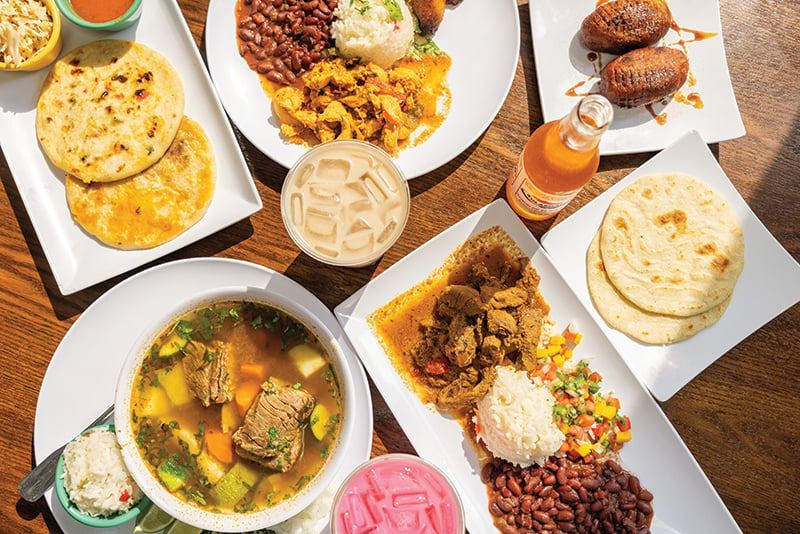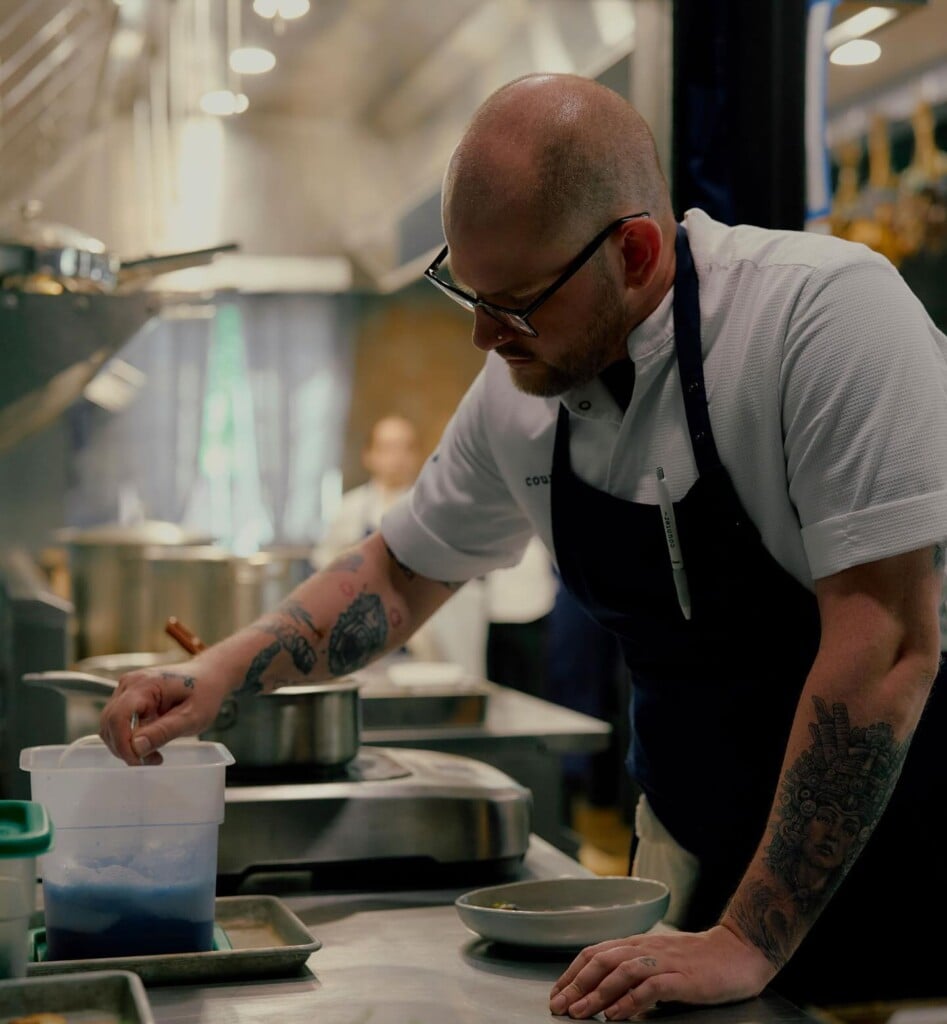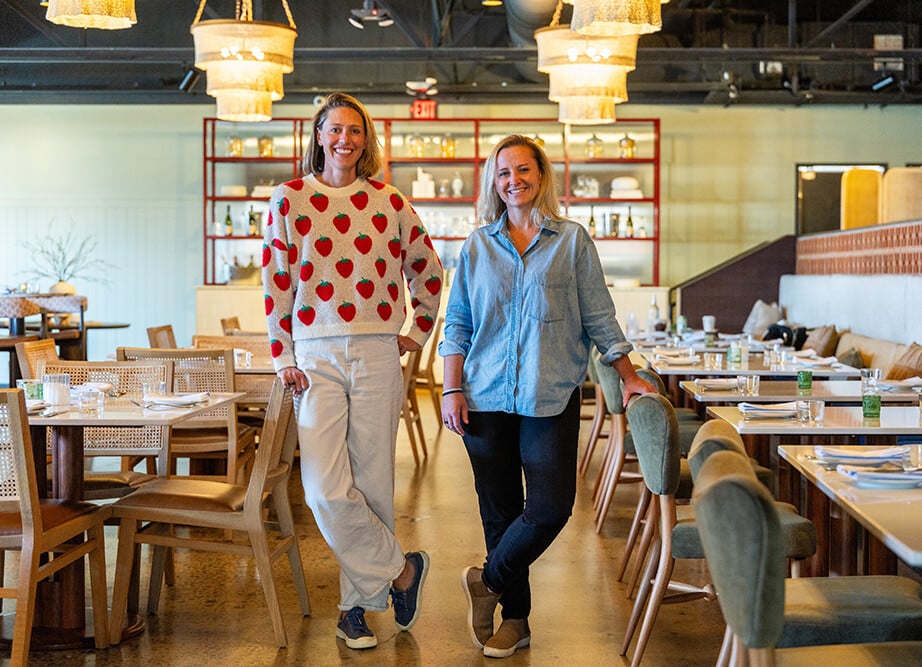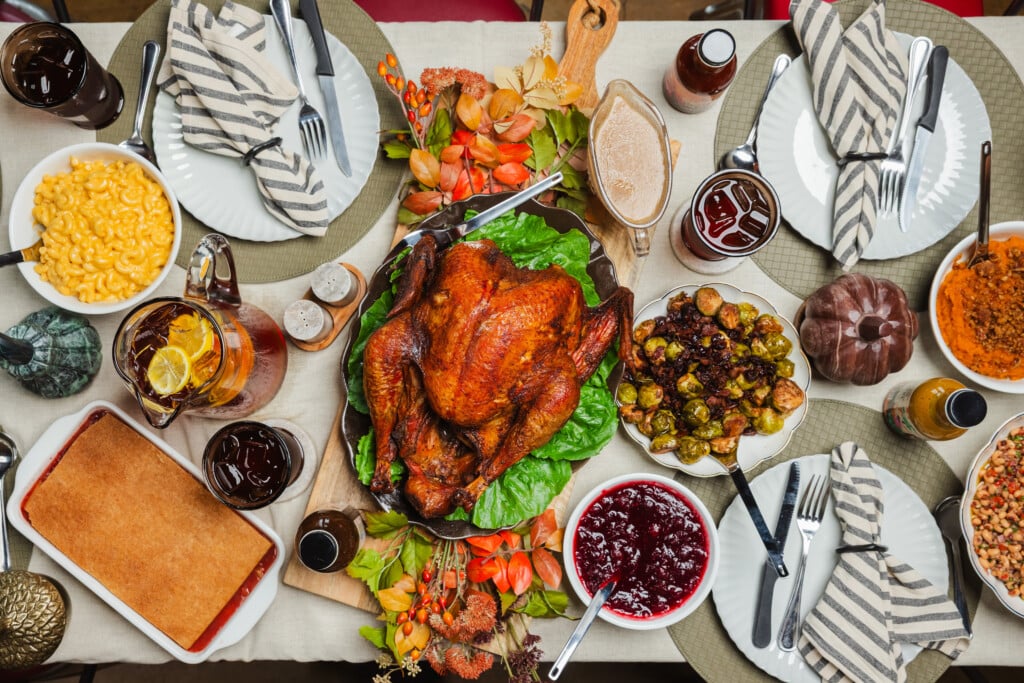Local Flavor: Pupusa 503
A family-run Salvadoran restaurant in University City offers pupusas, community, and family opportunity.

In April, I was scouring Google to make sure I hadn’t missed any contenders for our June taco issue when I found a listing for Pupusa 503. Not a taco joint, so I filed it away in my brain for later. Then, on a hot Saturday afternoon in early July, my internal pupusa clock went off.
The Salvadoran restaurant is in a small strip mall in the corner of a Target parking lot in University City. It was around 3 p.m. when my partner and I arrived, so I expected we’d be the only customers. But when we opened the tinted-glass door, we found all 10 tables occupied and a line six deep. A man behind the counter warmly welcomed us as he filled a plastic cup with ice and Pepto Bismol-pink fresco de cebada, a popular Salvadoran drink made with malted barley, sugar, and lemon. (The color isn’t natural.)
A teenage boy took orders below a wall painted in the blue and white of El Salvador’s flag, with its national motto, Dios Unión Libertad (God, Union, Liberty), in gold letters. A middle-aged woman in a pinafore apron whisked through the kitchen door with bowls of hearty soup and pupusas.
Salvadorans use many of the same ingredients as other Latin American cuisines: corn, rice, beans, cheese, roasted meats, plantains. El Salvador is on the Pacific, so it’s rich in seafood. But El Salvador’s most recognized dish is the pupusa, made by mixing masa (ground corn) with any combination of ingredients (beans, cheese, squash, garlic, meat, seafood, and loroco, an edible flower), then fried on a griddle like a pancake and served with a side of curtido, or cabbage slaw. Other Latin Americans make variations, but pupusas are thought to have originated with El Salvador’s Pipil tribe more than 2,000 years ago. In 2005, the country’s Legislative Assembly established it as the national dish.
Unable to stop thinking about Pupusa 503’s food for weeks, I returned later in July to meet Abigail Gálvez and her mom, Beatrice, the woman who breezed in and out of the kitchen on my first visit. Beatrice and her brother, Ismael Gonzalez, own the restaurant; Beatrice manages the kitchen, Ismael the front-of-house alongside Gonzalo Gálvez, Beatrice’s husband, who also works as a real estate agent. Eighteen other family members—Beatrice and Ismael’s spouses, children, siblings, nieces, and nephews—work there, too.
Abigail and I choose a corner table as Beatrice comes out of the kitchen wiping her hands.
“Our story originates with my grandparents immigrating from El Salvador to the United States with their children in 1997,” Abigail says. She’s 22—Beatrice’s oldest daughter, the oldest cousin, and a senior studying earth and environmental science at UNC Charlotte. She manages the restaurant’s marketing and communications, and she does most of the talking because Beatrice speaks limited English.
Abigail tells me that her grandparents, parents, aunts, and uncles lived in Long Island, where she was born, until 2002. But New York was expensive and nothing like their countryside hometowns in El Salvador. After a few family members visited North Carolina, the entire family moved down.
“We just love this place—how beautiful it is,” Abigail says. “In our home country, my mom had grown up by the beach, and my dad in the mountains. North Carolina reminded them of home because we’ve got the East Coast, then mountains on one side, and that’s literally how El Salvador is.”
When the family arrived in Charlotte, they founded a Spanish-language Pentecostal church, Iglesia Nueva Jerusalén Ciudad de Dios, which they still lead today.
“But it’s always been my mom’s dream to have a restaurant,” Abigail says. Beatrice chimes in, and Abigail translates. “Her (and Ismael’s) main focus when opening this restaurant was providing stability for me, my siblings, and my cousins to be able to study and have careers. While we’re studying, this can be our job until we get on our feet. They want us to reach even further.”
In English, Beatrice adds, “They have to learn. Wash dishes, clean the tables.”
“Yes, they want to make sure we learn the value of money and working for money,” Abigail says. “I’m the first child, so my natural inclination will always be to help them out. But it’s also my job to set an example for my siblings and cousins by getting an education and reaching even further. And we are able to get educations because of this place.”

“My mom uses really clean ingredients and maintains a health-conscious kitchen,” Abigail says. “Those who are vegan or vegetarian or who have gluten or nut allergies—they can all feel safe eating here. We all may have different lifestyles, but we can all eat at one table.”
Beatrice and Ismael waited until all of their children were in their teens to open Pupusa 503 in March 2021. They chose the University area because, while east Charlotte is full of Hispanic restaurants, Abigail says north Charlotte—where the family also lives and founded the church—has far fewer. This means less competition, and it allows Pupusa 503 to capture business from construction workers and tradesmen stocking up at neighboring Home Depot and Lowe’s.
Pupusa 503 serves all three meals and is open seven days a week. It serves nine types of pupusas, including chicharrón, loroco, and a giant Super Pupusa packed with cheese, beans, chicken, pork, loroco, and mixed veggies. Other menu items include breakfast platters, soups, tamales, carne asada, and pan-fried branzino—all dishes that Beatrice has long cooked for her family.
“This place is a hub,” Abigail says. “For those coming into the country who are Hispanic and who most likely only speak Spanish, it can be very intimidating to be in a country that does not speak your language or know your food. But when you come in here, you’ll be greeted in Spanish, and the menu is in Spanish. … They find a place here, where there’s familiar music playing and people who eat the same things they eat.”
Abigail says the family hopes to open a second location in a standalone restaurant elsewhere in Charlotte.
“It’s great to have these fusion and Tex-Mex restaurants in Charlotte, but there’s something special about us being authentic and local,” Abigail says. While a majority of Pupusa 503’s customer base is Hispanic, the family loves sharing their food with people who aren’t familiar with it. “We’re so happy to explain our food when people don’t know it. Food is a language we can all talk.”
Tess Allen is the associate editor.






